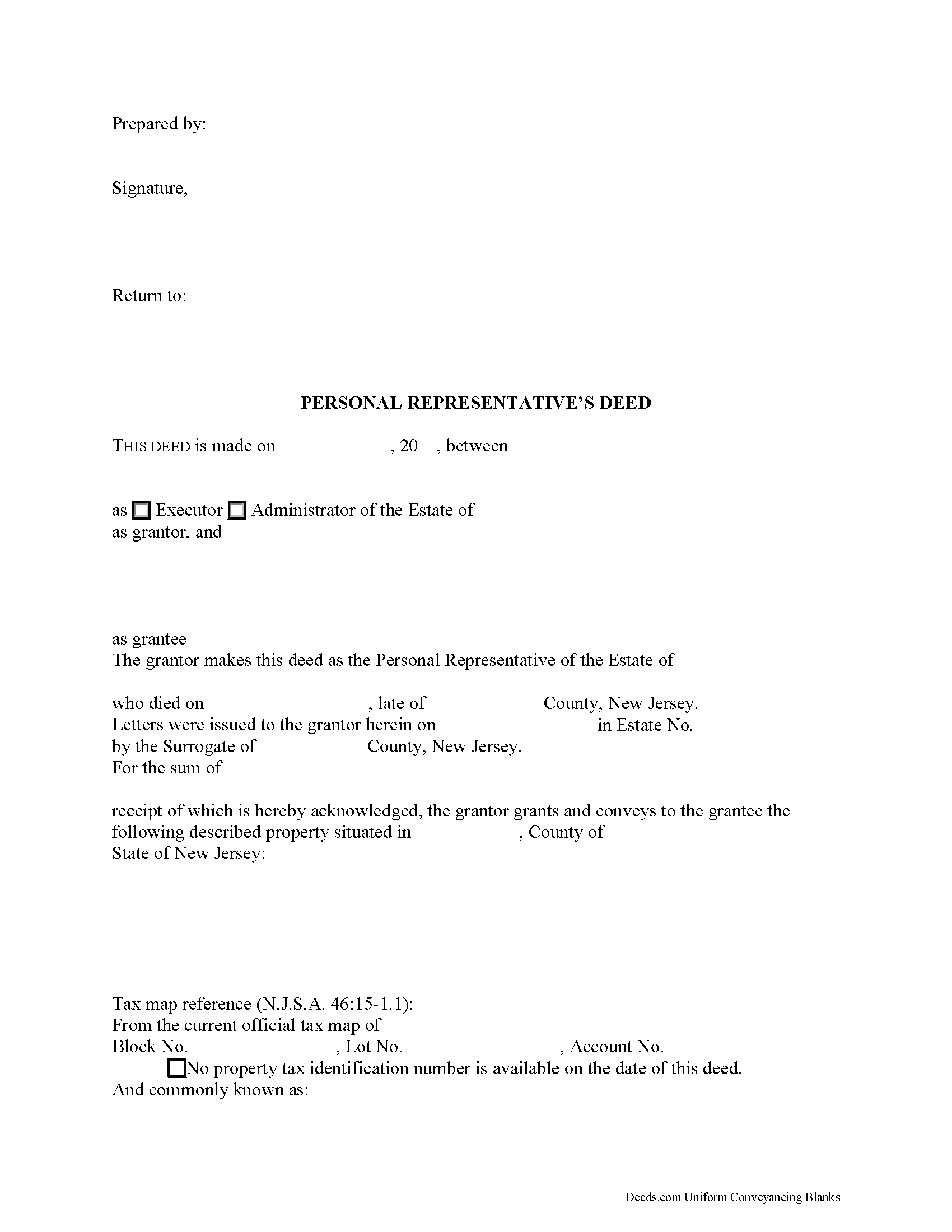Download New Jersey Personal Representative Deed Legal Forms

New Jersey Personal Representative Deed Overview

A personal representative's deed is a fiduciary instrument executed by a personal representative that conveys interest in real property from a decedent's estate to a devisee, heir, or purchaser.
In New Jersey, personal representatives (PRs) are appointed by the Surrogate Court following the opening of probate of a decedent's estate, and are responsible for settling and distributing the estate in accordance with any probated or applicable law of intestacy, and in the best interests of the estate (N.J.S.A. 3B:10-23).
A PR may be referred to as either an executor or an administrator, depending on the testacy status of the decedent. When a decedent dies testate (with a will) naming an executor of his or her estate, the court issues letters testamentary authorizing him or her as executor. When a decedent dies intestate (without a will) or when a will does not name an executor, the court issues letters of administration authorizing the heir or other applicant desiring letters as administrator.
Typically, a PR deed in New Jersey carries a covenant as to grantor's acts under N.J.S.A. 46:4-6. This means that the grantor (the estate's executor or administrator) promises that he or she has done no act to encumber the property and that he or she has not allowed anyone else to obtain any legal rights which affect the property (such as by making a mortgage or allowing a judgment to be entered against the grantor).
To transfer a clear title, the Surrogate Court must first file a waiver of transfer inheritance tax (if applicable) in the appropriate county Register of Deeds office. The waiver constitutes written consent of the Director of the Division of Taxation to transfer or release the decedent's property.
A properly executed deed grants and conveys title to the named grantee, who may be a devisee under a will; an heir entitled to distribution of the estate based on New Jersey's laws of intestate succession; or a purchaser. Required grantee information includes the grantee's name, address, marital status, and vesting information.
The deed names the granting PR and includes the PR's address, and capacity (executor or administrator), as well as the decedent's name, date of death, and county of residence. The deed cites the grantor's authority by referencing the date of grant of letters, the case number assigned to the estate, and the Surrogate Court where the estate is probated.
The full consideration, if any, given for the transfer must appear on the deed. If the transaction is exempt from realty transfer fees, as in a conveyance to a devisee or an heir to carry out distribution of the estate, note the reason for the exemption. The state requires an affidavit of consideration to be recorded with the deed.
Additionally, the deed must meet all requirements of form and content for documents affecting title to real property in New Jersey. Such requirements include a full legal description of the subject parcel, including the property's tax map reference, a recital of the source of title, and any relevant restrictions connected to the property.
A lawful deed includes the signature of the granting PR, acknowledged in the presence of a notarial officer. Include relevant supplemental documentation, such as the New Jersey seller's residency form, and any county-specific recording sheets, if applicable, with the deed for recording in the county wherein the subject parcel is situated.
Consult an attorney licensed in the State of New Jersey with questions regarding personal representative's deeds, as each situation is unique.
(New Jersey PRD Package includes form, guidelines, and completed example)